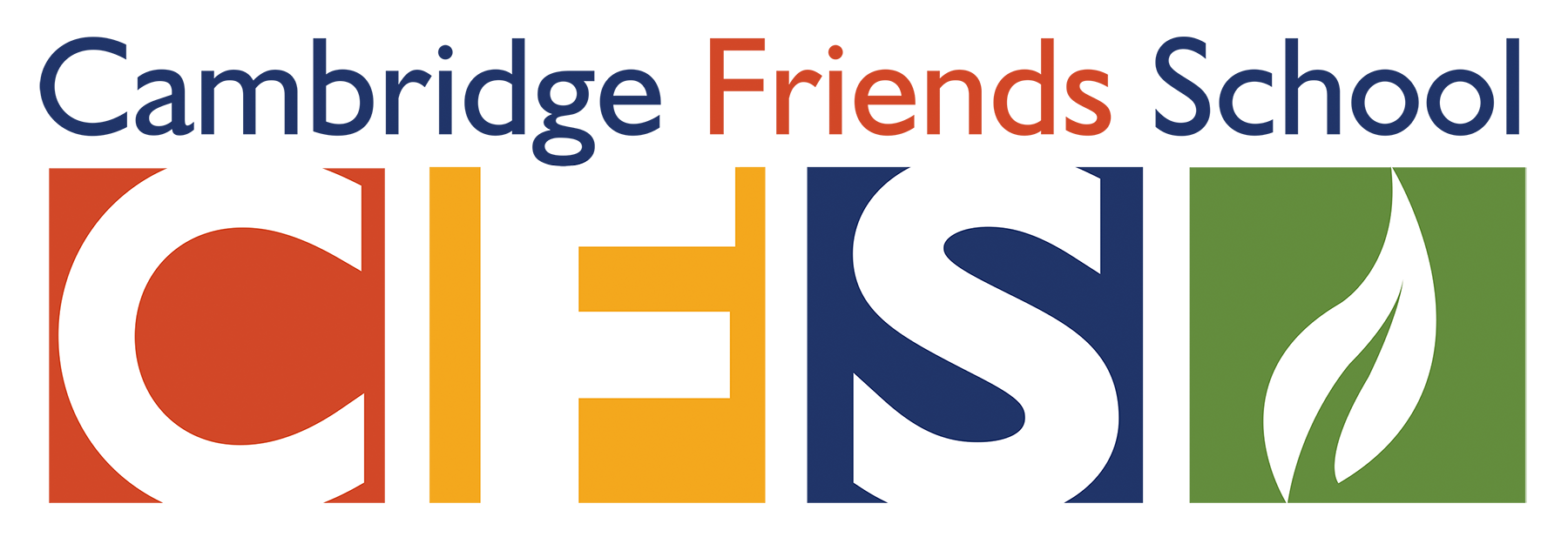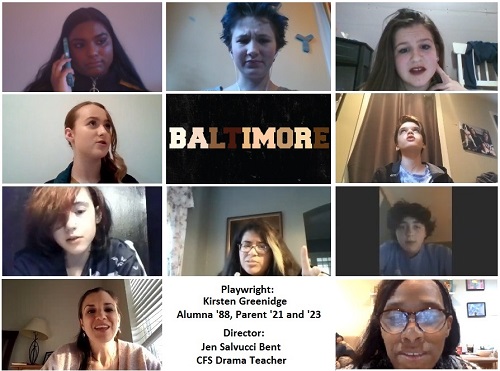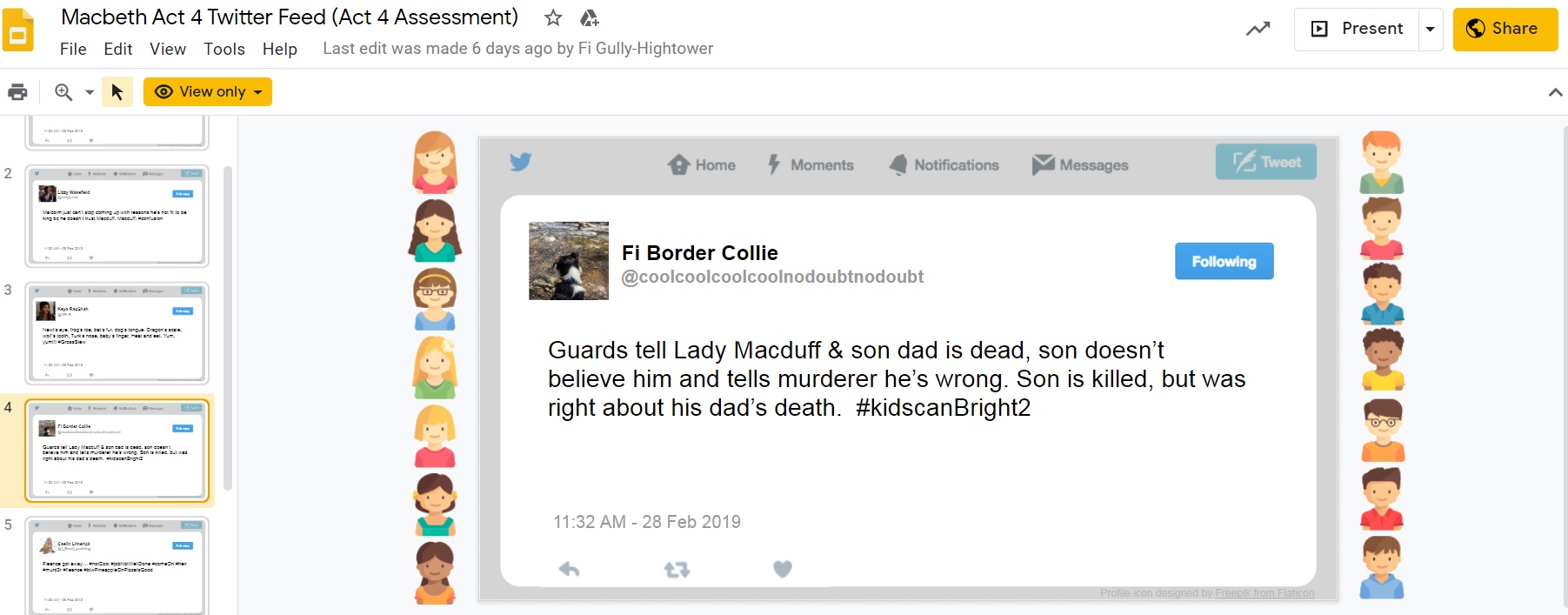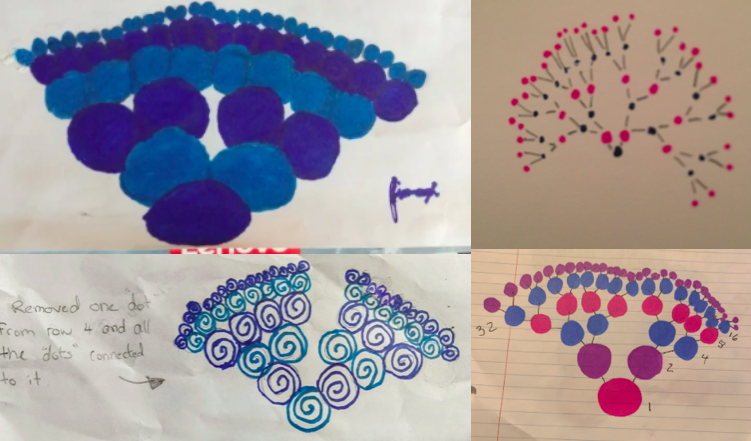Grade 8 Online Curriculum
Humanities
Students engage in two synchronous classes per week via Zoom and are encouraged to start conversations in Google Classroom, where they also access assignments and course resources.
Students are studying Shakespeare’s Macbeth accessing various supporting materials in Google Classroom including video renditions of the play. Paying particular attention to the terms “noble tragic hero” and “tragic flaw,” students have also delved into the meaning behind the well-known quote “Fair is foul, and foul is fair.” Learning about comic relief, foil, and allusion, students are also exploring emotions behind actions and how language can be perceived. Offering a fresh spin on Shakespeare’s work, students selected a scene from Act 4 to “Tweet” about on a Google Slides assignment mimicking the popular social media platform, Twitter. Students will also be working with VoiceThread to share and discuss the play in a modern way.
Math
Online math for eighth grade continues to combine the rigorous expectations of Algebra 1 standards with appropriate differentiation to meet the needs and interests of individual students. Differentiated instruction is offered via Google Meet two times per week, in addition to one full class Google Meet per week. Students are continuing their work in exponential equations, quadratic functions, polynomials and factoring, and rational expressions and equations.
Accessing assignments in Google Classroom, some lessons have been connecting to COVID-19 to help students see how math applies to real-world issues. For instance, prior to attending their online class about exponential functions, students were assigned to read an article in the New York Times about how powerful early intervention can be when fighting an epidemic. In Google Classroom students first discussed the difference between linear and exponential growth. After discussing the article and studying a graph which modeled the difference between preventing a single case now versus one week later, the students understood the exponential mathematics supporting how social distancing can “flatten the curve” and that the earlier such measures are taken, the better the results will be.
Science
Eighth-grade students attend class via Google Meet three times a week and access assignments and resources in Google Classroom. Continuing their work on watersheds and their importance for the quality of water in Boston and Cambridge, students watched a documentary Under Quabbin which looks at the history of the Quabbin Reservoir and talks about the importance of its cleanliness for Boston city residents. Students then worked in groups on a video project focusing on where Cambridge and Boston water comes from and the processes (both chemical and physical) that water has to go through before it arrives in our homes.
Students also learned about stormwater management and its impacts on water quality as well as the importance of wetlands and pervious surfaces (versus impervious surfaces). This served as an introduction to their Stormwater Management Proposal Projects (proposing how to effectively manage stormwater) which will include referencing GIS and story maps, manipulating data, and creating their own GIS map for stormwater management. Several experts in the field in Cambridge including Jamie O’Connell, Watershed Protection Supervisor at Cambridge Water Department, also shared their work in relation to stormwater management for students to begin mapping out their plans.
Art
Students access assignments with instructions and resources posted in Google Classroom, and join a Zoom meeting once a week. Students were mailed kits to ensure each student had access to the necessary materials for their projects. Concepts tackled during remote learning include shading to create an optical illusion, observational drawing or painting, making an abstract composition by rearranging text, and examining the abstract color field paintings of Alma Thomas. Eighth-grade students also collaborated remotely on building a memory book. These projects were easier to do at home, while still helping students to sharpen their fine motor skills, hone-in on their problem-solving and planning abilities, and continue to build student’s confidence in their own abilities. Responding to student interests, optional assignments including sewing do-it-yourself safety masks, homemade salt-dough clay, and making paper beads have been shared to encourage ongoing creativity.
Physical Education
Students have been accessing age-appropriate exercise videos and suggested activities via Google Classroom, in addition to attending a Google Meet once per week. Online learning provides students with resources to promote independence, remain active, and maintain overall health and wellness during this challenging transition. Home fitness routines, agility activities, yoga, dance, backyard games, jump rope, shadow boxing, and wellness videos encourage students to think creatively about movement and wellness options during this time. Weekly check-ins provide invaluable opportunities to work-out toether and engage with students to gauge coping skills during this challenging experience. Students also share alternative ways that they remain active with their families.
Drama
Eighth-graders continued their work on a special adaptation of Baltimore by Kirsten Greenidge, CFS Alumna ’88, and Parent ’21 and ’23. This award-winning Boston playwright customized her original play to be age-appropriate and reflective of CFS’ student population. Rehearsing as a class via Google Meet twice per week, and meeting with the entire Middle School once a week, has helped students adapt their performances from stage to screen. Students successfully held a virtual Zoom performance of the play with a student technical director handling sound cues and students controlling their screens to offer as best an online production as possible. Click here to learn more about the play.
Spanish
Eighth-grade students attend Spanish class via Google Meet once per week for a more robust and immersive experience. Students continue to review basic structures, while adopting new vocabulary and grammar that serves to broaden speaking, reading, listening, and writing of Spanish. Integrating online tools for a more engaging experience, students use various apps such as Word Reference, Nearpod, Kahoot, Mentimeter, and Gimkit, while also accessing assignments in Google Classroom.
Eighth grade has been reviewing past, present, and future tenses and are practicing recognizing more advanced tenses like imperfect tense, conditional tense, present subjunctive tense and the present progressive tense. Students have been practicing how to formulate sentences using most of the question words such as “what?”, “when?”, “where?”, “which?”, “how?”, “how much?”, “who?”, and the most challenging “why?”. Eighth grade keeps increasing vocabulary by reading news in Spanish and reporting the events during online class. Students have also been reviewing how to tell dates (day, month, year), numbers, and seasons.
As a culmination of their learning, students have been tracking their learning progress with a Spanish course checklist and at the end of the course, they will share with their peers one example of each item checked. Students have also been working on a project called “The End of Term Mini-Game,” in which they create a board game and write all of the content taught and learned in class, while adding more grammar and vocabulary aspects based on their personal interests.



